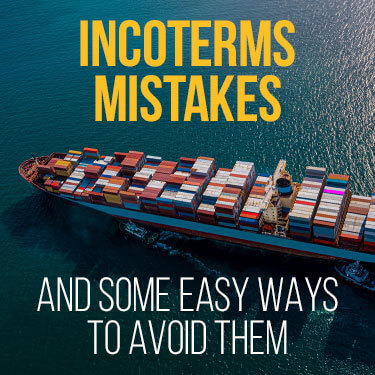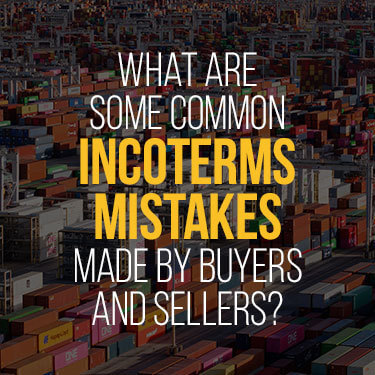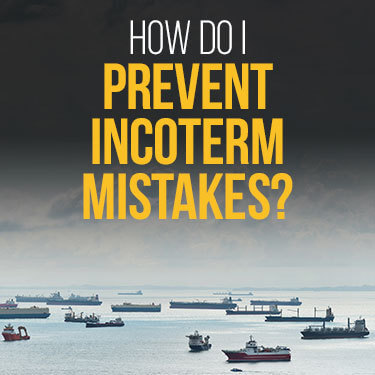
Many international buyers and sellers unknowingly make Incoterms mistakes when conducting a transaction. The purpose of Incoterms is to clarify the responsibilities between buyers and sellers conducting business with one another. However, when used incorrectly, Incoterms can create the same type of confusion they’re meant to prevent.
Some common Incoterms mistakes that buyers and sellers make include:
Consulting sessions with a customs broker will prevent these mistakes.
Fortunately for you, we’ll provide more details about Incoterms and what you can do to avoid these mistakes.

Essentially, Incoterms are used to promote and make international trade easier for buyers (importers) and sellers (exporters). The International Chamber of Commerce (ICC) created Incoterms so that buyers and sellers would better understand their responsibilities.
Incoterms clearly define the roles of the buyer and the seller in conducting international trade with one another. Defining the roles between these two parties makes the importing/exporting process much easier than it normally would be.
Before you can understand some of the common Incoterms mistakes, you should first know what Incoterms are and the basics of how each work. In total, there are 11 different incoterms divided into 4 different categories. They are:
In our article, 11 types of Incoterms, you’ll find that we listed each Incoterm as we did here with their corresponding responsibilities. As you work your way through Category E to Category D, the responsibilities for sellers will increase while buyer responsibilities will decrease. Likewise, navigating Category D to Category E will show an opposite trend.
Some Incoterms can be used for shipments transported only by water, while other types of Incoterms can be used for shipments utilizing any mode of transportation. The table below will provide you with a better visual representation of the modes of transport for each Incoterm.
| Type Of Incoterm | Mode Of Transport |
| EXW | All modes of Transport |
| FCA | All Modes of Transport |
| FAS | Sea or Inland Waterway Transport Only |
| FOB | Sea or Inland Waterway Transport Only |
| CFR | Sea or Inland Waterway Transport Only |
| CIF | Sea or Inland Waterway Transport Only |
| CPT | All Modes of Transport |
| CIP | All Modes of Transport |
| DPU | All Modes of Transport |
| DAP | All Modes of Transport |
| DDP | All Modes of Transport |
Memorizing which modes of transport each term corresponds with will make it easier for importers to identify which one they should use.
For more on what are Incoterms®, read our article on this subject.

Our 45 Minute Licensed Expert Consulting Will Personally Guide You.

We’ve established that the chosen Incoterms between a buyer and a seller is supposed to clarify the duties between the two. However, there’s the possibility that one or both parties might misunderstand the Incoterms rule itself.
In other instances, buyers and sellers might underestimate the responsibilities dictated to them by the Incoterms. Regardless of the reason, here are some of the most common Incoterms mistakes that you and the seller should look out for.
One Incoterms mistake that importers make is that they don’t specify the exact location that they want their goods delivered to. Simply using the name of a city like FCA Miami or FCA Los Angeles isn’t going to give the seller a good enough indication of where to transport goods. With only this information to go on, the seller may choose any delivery point within the general area provided.
This can put the buyer in a very inconvenient position. You will have to locate your goods and then pay extra money to have them picked up and delivered to where you intended them to be originally delivered. To prevent mistakes like this from happening, give a specific location. This could be the name of a port or even an address and postal code.

FOB Incoterms are one of the more evenly-sided of all the Incoterms. It splits the responsibilities between buyers and sellers quite fairly. However, both buyers and sellers make the mistake of thinking that these Incoterms can be used for containerized cargo.
Many buyers and sellers don’t realize that FOB doesn’t apply to containerized shipments. One reason for this is that the shipment is handed off to a carrier that is some distance from the port itself. The cargo is usually given to the carrier at a terminal where it will sit before it’s loaded on the ship that will transport it.
During this wait time, responsibility for the cargo is still on the seller until the cargo is loaded. Therefore, problems and disputes can pop up if the cargo suffers damage. Some other Incoterms that are also not applicable for container shipments include the following:
Incoterms that can rectify these problems and are suitable for containerized shipments are:
If an international payment method like a letter of credit is agreed upon between the buyer and seller, the chosen Incoterms needs to match the requirements of the seller’s bank. Some buyers and sellers don’t realize this, unfortunately. If the Incoterms aren’t compatible, documents must be submitted to the buyer’s bank to prove that both parties trust each other and the conditions have been agreed to.
Rather than go through this hassle, buyers and sellers should agree to Incoterms in the C Category like CIP or CIF. Incoterms within this category are better used for the letter of credit type of payment.
Another misconception that buyers and sellers have is that they think Incoterms are used to define the passing of a title transfer. Rather than using Incoterms to define a title transfer from the seller to the buyer, they should be negotiated using a sales contract.

As we mentioned before, certain Incoterms are only applicable to specific modes of transportation. It’s an easy mistake to avoid, but one that buyers and sellers make nonetheless. To prevent this from happening, you and the seller should check your chosen Incoterms to make sure that it applies to the mode of transport that will be used.
DDP Incoterms place just about all of the import responsibilities on the seller. Some of these responsibilities include the local taxes of the buyer's country, duties and special documentation for regulated goods.
Since the seller is responsible for these tasks, the DDP, as well as the DAP Incoterms, are very favorable for buyers. That said, these Incoterms can still cause problems for buyers if the seller is not familiar with import regulations in the buyer’s country.
A seller that does not follow the customs regulations of the buyer's country will make the shipping process a disaster for both parties. Before both the buyer and seller agree to Category D Incoterms, the buyer should make sure that the seller is familiar with the customs responsibilities of the buyer’s country.
Secondly, the buyer needs to verify that the seller is a registered overseas importer with their country’s customs organization. This will be a requirement if DAP Incoterms ® are used.
Related: 5 Common Mistakes Made By New Importers
Incoterms dealing with insurance, such as CIF and CIP, often confuse buyers and sellers. Under these Incoterms, the seller covers insurance and the coverage itself should be a minimum of 110 percent of what the value of the goods are.
Unfortunately, this amount of minimum insurance on your goods might not be enough under the agreed conditions in the commercial contract. If you require more coverage for your goods, you will have to communicate this with the seller.
Due to all these mistakes, it might seem that Incoterms might come across as confusing. However, our article on the advantages of Incoterms will show you that there are plenty of benefits to using them.

There are a few different ways that you can avoid these Incoterms mistakes that we discussed. The first one we’ve already hinted at and that is to communicate with your seller to ensure they understand the chosen Incoterms as well as you do.
While Incoterms help facilitate global trade between nations by dictating rules between buyers and sellers, misunderstandings as to what the Incoterms mean can occur. Discussing the Incoterms with your seller will help you determine if they’re on the same page or not.
The most useful tool that can be used to prevent these mistakes from ever occurring is a Licensed Customs Broker. Whether you’re a buyer or a seller, a broker can provide you with some important information regarding import or export procedures. They’re also experts on Incoterms, which means you can have them verify that the Incoterm you and the other party agree on is understood by both of you.
At USA Customs Clearance, we have a team of licensed customs brokers on our staff that can give you the help that you need. We guarantee that after one consulting session, you’ll leave with more information than you had when you came in. If you decide to hire us, we’ll help you stay on track with all of the import requirements that are expected of you.
Another product we offer is our continuous customs bond. With this bond, you’ll be able to import as many goods, regardless of value, into the country for an entire year. No matter what your importing need are, we have a team that can provide stellar assistance.
Call us today at (855) 912-0406 or reach out via our online contact form if you have a direct inquiry.

Our 45 Minute Licensed Expert Consulting Will Personally Guide You.
 Copy URL to Clipboard
Copy URL to Clipboard
Add your first comment to this post